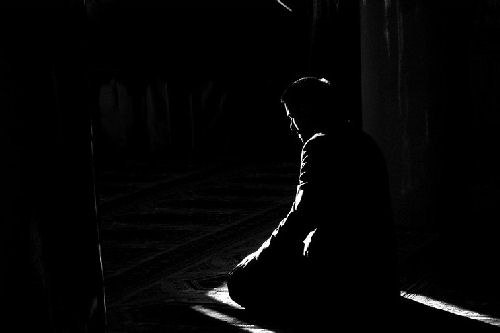From the Psalter:
The prayers of David son of Jesse are ended.
(From the Daily Office Lectionary – Psalm 72:20 (NRSV) – July 30, 2014)
 “Wait! I’ve never seen that verse.” I probably have, actually, but as with much of Scripture seeing it and paying attention to it are rather different things. In any event, that was my thought as I read the morning psalm today from the Bible instead of from the Book of Common Prayer.
“Wait! I’ve never seen that verse.” I probably have, actually, but as with much of Scripture seeing it and paying attention to it are rather different things. In any event, that was my thought as I read the morning psalm today from the Bible instead of from the Book of Common Prayer.
I have read the Psalms four times a year for more than twenty years; I was ordained a deacon in 1990 and began, part of my clergy discipline, the regular round of readings in the Daily Office lectionary including its every-three-month rotation through the Psalter. More than ninety times now, and I cannot recall ever reading, saying, or chanting, “The prayers of David son of Jesse are ended.”
So . . . I turn to page 686 in my Prayer Book and discover . . . it’s not there! Verse 20 simply isn’t there in the Prayer Book version of Psalm 72. Maybe I haven’t ever seen this verse before!
I’m used to not seeing the Psalter’s superscriptions in the BCP, those blocks of information that precede the actual song in many biblical manuscripts, those introductory notes where we find primarily technical, descriptive terms and phrases that relate to the authorship or performance of the psalm to which they are attached. Some are there, but mostly they have been edited away. I presume that the Prayer Book editors considered verse 20 some sort of footnote of similar liturgical or spiritual import to the superscriptions (which is to say none) and, thus, deleted it.
But this morning I find myself drawn to it and intrigued by what it means to say that prayers are “ended,” particularly given alternative translations of the original Hebrew kalah. This word appears frequently in the Hebrew scriptures – over 200 times; it occurs twenty-one times in the Psalms and is variously translated in the psalter and elsewhere.
Here it is given what I take to be the simplest of meanings: Psalm 72 is the last of the psalms (“prayers”) ascribed to David – whatever follows are by other poets. But elsewhere it has been interpreted to mean something quite different.
For example, in Psalm 69 it is used to describe failure of one’s eyesight (for sight to “grow dim” as the NRSV puts it):
I am weary with my crying; my throat is parched. My eyes grow dim with waiting for my God. (Ps. 69:3, NRSV)
I have grown weary with my crying; my throat is inflamed; my eyes have failed from looking for my God. (Ps. 69:4, BCP)
In Psalm 18 it is rendered as “consumed” in the NRSV and as “destroyed” in the BCP:
I pursued my enemies and overtook them; and did not turn back until they were consumed. (Ps. 18:37, NRSV)
I pursue my enemies and overtake them; I will not turn back till I have destroyed them. (Ps. 18:38, BCP)
What if these meanings are what the final, BCP-exluded verse of Psalm 72 is really getting at? What would it mean to end a psalm with the thought, “The prayers of David have failed” or “The prayers of David are consumed” or “The prayers of David are destroyed”? In light of today’s conflicts throughout the world, especially in the Middle East, and most especially in Israel-Palestine, Psalm 72’s petition that the rulers of nations be given righteousness that they may govern with justice and in peace would certainly seem to have failed . . . .
Perhaps the most poignant and fitting alternative translation of kalah is found in Psalm 84, in which it is rendered as expressing deep desire and longing (“yearning”):
My soul longed and even yearned for the courts of the Lord; My heart and my flesh sing for joy to the living God. (Ps. 84:2, NRSV)
My soul has a desire and longing for the courts of the Lord; my heart and my flesh rejoice in the living God. (Ps. 84:1b, BCP)
Given the tenor of the petitions of Psalm 72, I think this may be the best way to understand verse 20. The psalms, the prayers of David are not ended. They are not destroyed or consumed. They have not failed . . . but neither have they not been answered. The world still longs for peace. The world still yearns for justice. The world still desires righteousness.
This is why the church continues, day in and day out, every three months, four times a year, to read, recite, chant, and sing the psalms. They express a deep, a very deep still-unfulfilled yearning for the reign of God. The prayers of David son of Jesse are not ended. Perhaps the Prayer Book editors were right in omitting verse 20 . . . .
====================
A request to my readers: I’m trying to build the readership of this blog and I’d very much appreciate your help in doing so. If you find something here that is of value, please share it with others. If you are on Facebook, “like” the posts on your page so others can see them. If you are following me on Twitter, please “retweet” the notices of these meditations. If you have a blog of your own, please include mine in your links (a favor I will gladly reciprocate). Many thanks!
====================
Father Funston is the rector of St. Paul’s Episcopal Church, Medina, Ohio.



Leave a Reply